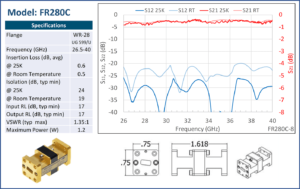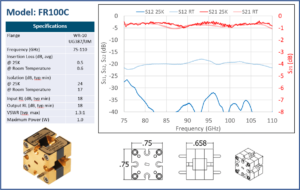It is a common misconception that isolators designed to work at room temperature will work reasonably well at cryogenic temperatures. The problem is that the ferrite materials have a strong temperature dependence that impacts the signal rotation. This can cause significant over-rotation of the signal and severely degrade performance at cryogenic temperatures.
“We tried using regular isolators from one vendor. We cooled them down and assumed they would work, but they weren’t behaving right.”
Alexander Anferov, GRA
Shuster Lab, University of Chicago
“We can get down to less than 100 Kelvins with commercially available cryo-coolers… Our biggest challenge was finding an isolator that could perform at those temps. Fortunately for us, a company called Micro Harmonics had just designed some specifically for NASA.”
Dana Wheeler, President
Aerowave, Inc.
At Micro Harmonics we have developed a line of isolators designed for optimal performance at cryogenic temperatures. The ferrite is biased in magnetic saturation for minimal insertion loss, and the length of the ferrite rod is optimized to achieve the desired rotation at cryogenic temperatures.
Sophisticated models are constructed to simulate the thermal stress levels throughout the isolator as it is cooled. Materials are chosen that reduce thermal stress. Reliability is verified through repeated thermal cycling in a liquid nitrogen bath. Our isolators are built to withstand the rigors of repeated cryogenic cycling.
Our cryogenic isolators are routinely tested at 25 K in our cryostat. We use a resistive thin film for isolation that is not in the class of super conductors. The performance has been independently verified down to 1 K by researchers at the University of Chicago and at the Smithsonian Astrophysical Observatory.
Eight models of the cryogenic isolator are now available as indicated in the Table below. These models cover most frequencies from 26 GHz to 220 GHz. Models at WR-4.3 and WR-3.4 will be added pending customer demand.
| Model | Flange |
Band (GHz) |
Insertion Loss (dB, typ @ 25 K) |
Isolation (dB, typ @ 25 K) |
|---|---|---|---|---|
| FR280C | WR-28 | 26 – 40 | 0.5 | 25 |
| FR148C | WR-15 | 50 – 75 | 0.5 | 28 |
| FR122C | WR-12 | 60 – 90 | 0.7 | 25 |
| FR100C | WR-10 | 75 – 110 | 0.5 | 30 |
| FR090C | WR-9 | 82 – 122 | 0.5 | 30 |
| FR080C | WR-8 | 90 – 140 | 0.7 | 27 |
| FR065C | WR-6.5 | 110 – 170 | 0.9 | 23 |
| FR051C | WR-5.1 | 140 – 220 | 1.2 | 23 |
Cryogenic Isolators


